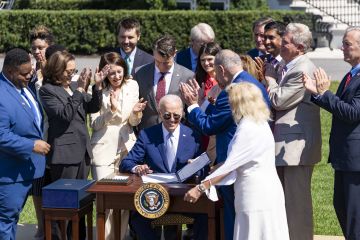"The 'CHIPS and Science Act' will make crucial investments in NSF's mission and at an incredibly important time when global competition is fiercer than ever."
- NSF Director Sethuraman Panchanathan
About the "CHIPS and Science Act"
The nation's economic and national security depends on our ability not only to harness the technologies of today, but to lay the foundation for the industries of the future. The nation must also inspire and train the next-generation STEM workforce, unleashing the potential of tomorrow's innovators by investing in their ideas today.
On August 9, 2022, President Joe Biden signed into law the "CHIPS and Science Act of 2022." The act authorizes historic investments in curiosity-driven, exploratory research and use-inspired, translational research. These investments will advance the most innovative ideas across all areas of science and engineering — accelerating their translation to solutions for today's challenges and tomorrow's — at speed and scale.
 On this page
On this page
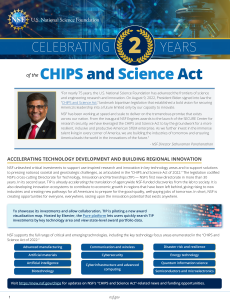
Celebrating Two Years of “CHIPS and Science”
Learn how the act's investments in NSF will help the United States remain a global leader in innovation.
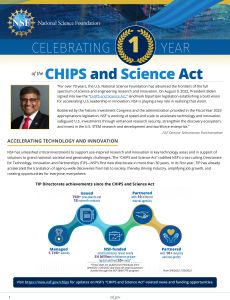
Celebrating One Year of "CHIPS and Science"
Learn how the act's investments in NSF will help the United States remain a global leader in innovation.
CHIPS and Science and NSF
The "CHIPS and Science Act's" investments in the U.S. National Science Foundation will help the United States remain a global leader in innovation. Implementation of this legislation will be key to ensuring that ideas, talent and prosperity are unleashed across all corners of the nation. The act:

Doubles NSF's budget over five years
CHIPS and Science authorizes an increase in overall funding for NSF — $81 billion over Fiscal Years 2023–2027 — which, if appropriated, would double the agency's budget.
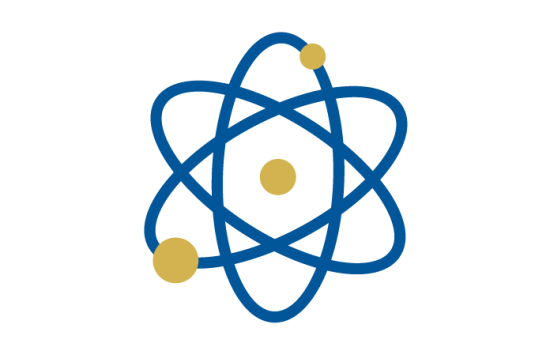
Strengthens fundamental research
CHIPS and Science supports early-stage research that will create revolutionary new ideas, including in areas such as the food–energy–water system, sustainable chemistry, risk and resilience, clean water systems, technology and behavioral health, critical minerals, precision agriculture, and unmanned aircraft technologies.
The act also invests in research infrastructure, advanced computing and international collaborations.
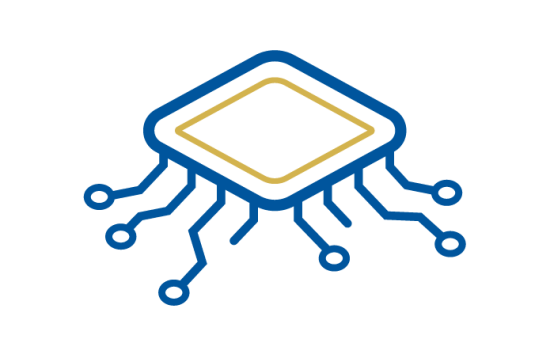
Establishes Technology, Innovation & Partnerships
CHIPS and Science formally codifies into law Technology, Innovation and Partnerships — NSF's first new directorate in more than 30 years — and authorizes $20 billion for its initiatives over FY 2023–2027.
The act establishes 10 key technology areas critical to the nation's economic and national security.
It also creates the Regional Innovation Engines program, supports establishment of translation accelerators and test beds, invests in workforce development and training, and invests in programs to provide entrepreneurial training.
Find and see TIP investments in key technology areas and programs all across the nation.

Invests in STEM education
CHIPS and Science establishes new programs to scale up innovations in pre-K-12 STEM education.
It strengthens existing NSF programs, such as Advanced Technological Education, CyberCorps Scholarship for Service, and the Robert Noyce Teacher Scholarship program.
The act also appropriates $200 million in funding for semiconductor workforce training and education activities.

Advances diversity in STEM
CHIPS and Science builds upon NSF's Broadening Participation Portfolio of programs focused on improving accessibility and enhancing demographic, geographic and institutional diversity in STEM.
It bolsters opportunities for minority-serving institutions, emerging research institutions and rural communities; increases NSF investments in EPSCoR jurisdictions over a seven-year period; and establishes a chief diversity officer at NSF to advance diversity, equity and inclusion.
It also codifies the NSF INCLUDES initiative and renames it the NSF Eddie Bernice Johnson INCLUDES initiative.

Addresses research security
CHIPS and Science sets up NSF's Office of Research Security and Policy and the chief of research security to provide guidance and resources to researchers.
It establishes an independent risk assessment center to help institutions and researchers understand and mitigate security risks.
The act also provides NSF with clear prohibitions and disclosure requirements around foreign talent recruitment programs and potential conflicts of interest.
Learn more about NSF's research security efforts.
Key technology areas
NSF supports the full range of critical and emerging technologies, including the key technology focus areas enumerated in the "CHIPS and Science Act of 2022":
August 27, 2024
U.S. National Science Foundation investing $14.5M in inaugural Innovation in Two-Year College in STEM Education awards
August 12, 2024
NSF announces investment roadmap for the Technology, Innovation and Partnerships Directorate
August 6, 2024
Celebrating two years of “Chips and Science”
July 30, 2024
NSF invests up to nearly $52M to align science and technology research and development investments with outcomes essential to U.S. competitiveness
July 24, 2024
NSF-backed SECURE Center will support research security, international collaboration
July 24, 2024
U.S. National Science Foundation and Department of Commerce partner to advance semiconductor workforce development
July 18, 2024
TIP launches investment visualization and search capability
July 16, 2024
NSF invests more than $30M to enable experiential learning in key technologies
July 9, 2024
NSF publishes data on letters of intent submitted to the NSF Regional Innovation Engines program
June 5, 2024
NSF enhances research security with new TRUST proposal assessment process
April 16, 2024
New funding opportunity seeks to invest in additional NSF Regional Innovation Engines
March 21, 2024
NSF announcement on JASON report: Safeguarding the Research Enterprise
February 14, 2024
NCSES Launches Web Page Dedicated to the Cybersecurity Workforce Data Initiative
January 9, 2024
NSF and philanthropic partners announce $16 million in funding to prioritize ethical and social considerations in emerging technologies
December 14, 2023
NSF announces first-ever Accelerating Research Translation awards to empower academic institutions to speed and scale translational research
September 29, 2023
NSF launches pilot program to enhance the potential for success of startups
September 29, 2023
NSF announces award for its Regional Innovation Engines Builder Platform
September 28, 2023
NSF invests $19.6M in emerging research institutions to grow their capacity to participate in regional innovation ecosystems and announces next funding opportunity
September 28, 2023
NSF partners with the Institute for Progress to test new mechanisms for funding research and innovation
September 28, 2023
NSF invests $35M in future manufacturing
September 27, 2023
NSF invests $18.8M in inaugural cohort of projects enabling experiential learning in key technologies
September 14, 2023
NSF and partners invest $45 million in the future of semiconductors
September 13, 2023
New NSF effort expands I-Corps™ Teams training program
August 15, 2023
NCSES Launches Web Page Dedicated to the National Secure Data Service Demonstration Project
July 26, 2023
NSF, EDA announce official coordination on regional innovation programs
July 18, 2023
NSF announces evaluation contract for its Regional Innovation Engines Program
May 8, 2023
Dear Colleague Letter: Request for Information on the Capacity of Institutions of Higher Education to Produce Graduates with Degrees, Certifications, and Relevant Skills Related to Artificial Intelligence
May 8, 2023
Dear Colleague Letter: Request for Information on Future Topics for Workforce Development in Emerging Technology Career Pathways
May 23–24, 2023 | Workshop event
NSF Microelectronics Education Virtual Workshop
May 4, 2024
Dear Colleague Letter: A Request for Input on the Development of the U.S. Research Security and Integrity Information Sharing Analysis Organization
May 1, 2023
NSF seeks input to develop an investment roadmap for its new Directorate for Technology, Innovation and Partnerships
April 27, 2023
NSF and SRC invest in 6 sites for undergraduate research experiences in semiconductors
March 16, 2023
Celebrating one year of TIP
February 9, 2023
New $60 million NSF program aims to increase the speed and scale of research solutions
January 26, 2023
NSF announces nearly $50 million partnership with Ericsson, IBM, Intel, and Samsung to support the future of semiconductor design and manufacturing
January 10, 2023
NSF, NobleReach Emerge partner on new effort to speed biotechnology development and translation
December 8, 2022
New $20 million program promotes capacity building to broaden participation in regional innovation ecosystems
November 29, 2022
DCL: Scholarships in STEM Program (S-STEM) Responsiveness to the CHIPS and Science Act of 2022
October 31, 2022
DCL: Robert Noyce Teacher Scholarship (Noyce) Program Responsiveness to the CHIPS and Science Act of 2022
October 19, 2022
New NSF workforce development program opens new doors in emerging technology fields
October 18, 2022
Important changes to the NSF Engines BAA for Type-2 proposals
September 19, 2022
NSF launches entrepreneurial fellowship for engineers and scientists
July 28, 2022
Explore data and collaborate with proposers for NSF Regional Innovation Engines across the U.S.
CHIPS-related funding opportunities
Please be mindful of solicitation deadlines. For a full list of open funding opportunities, please visit the NSF Funding Search.
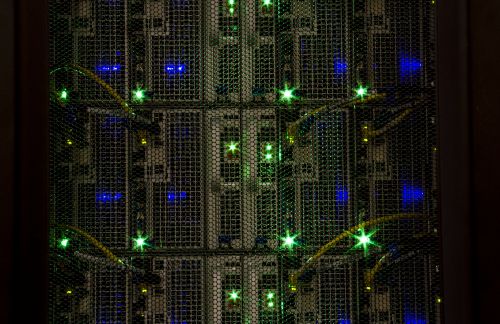
U.S. National Science Foundation and Department of Commerce Solutions Offering for the Network Coordination Hub for the National Network for Microelectronics Education Program
A Network Coordination Hub for the National Network for Microelectronics Education.
View the opportunity
NSF Regional Innovation Engines (NSF Engines)
NSF Engines program creates regional-scale, technology-driven, inclusive innovation ecosystems throughout the United States
View the opportunity

Ideas Lab: Advancing Cell-Free Systems Toward Increased Range of Use-Inspired Applications
The adoption of cell-free systems, enable new applications of this technology and contribute to the growth of the U.S. bioeconomy.
View the opportunityPlease be mindful of solicitation deadlines. For a full list of open funding opportunities, please visit our NSF funding search.
Ideas Lab: Use-Inspired Acceleration of Protein Design
USPRD aims to advance protein design and its applications to the next level.
Responsible Design, Development, and Deployment of Technologies (ReDDDoT)
The program aims to support research, implementation and education projects involving multi-sector teams.
Enabling Access to the Semiconductor Chip Ecosystem for Design, Fabrication, and Training (Chip Design Hub)
This solicitation seeks proposals to establish a community infrastructure that supports the entire IC chip design process.
NSF and Micron Foundation Partnership for the Robert Noyce Teacher Scholarship Program
This Dear Colleague Letter (DCL) encourages submission of proposals to the Robert Noyce Teacher Scholarship (Noyce) program.
Future of Semiconductors (FuSe2)
The goal of this solicitation is to cultivate holistic approaches to enable progress in new semiconductor technologies.
Research Security and Integrity Information Sharing Analysis Organization (RSI-ISAO)
OCRSSP seeks to establish an independent RSI-ISAO to empower the U.S. research community.
Dear Colleague Letter: Workshop to Inform Development of the NSF Research on Research Security Program (RRSP)
This DCL seeks proposals to organize and facilitate a single workshop that will bring together diverse perspectives.
Assessing and Predicting Technology Outcomes (APTO)
A new program on Assessing and Predicting Technology Outcomes (APTO) to assess how investments in science and technology research.
Dear Colleague Letter: Equitable and Transformative Approaches to Educating the Semiconductor Workforce (ETA-ESW)
This DCL announces a cooperative activity between NSF and the Micron Foundation to stimulate transformative approaches...
Dear Colleague Letter: Advancing Microelectronics Education
This DCL encourages submission of education proposals in all settings, both formal and informal.
IUSE: Innovation in Two-Year College STEM Education (ITYC)
A Focus on the Academic Experiences of Two-Year College Students and (2) Leveraging Institutional Strengths and Innovation.
National Science Foundation - Future of Semiconductors (FuSe)
This solicitation is to cultivate a broad coalition of researchers and educators from across science and engineering communities.
Accelerating Research Translation (ART)
To build capacity and infrastructure for translational research at U.S. Institutions of Higher Education.
Enabling Partnerships to Increase Innovation Capacity (EPIIC)
To broaden participation in innovation ecosystems that advance emerging technologies.
Regional Innovation Engines Program
Galvanizing use-inspired research, technology translation and workforce development through regional coalitions.
Experiential Learning for Emerging and Novel Technologies (ExLENT)
Supporting experiential learning opportunities that develop crucial skills needed to succeed in emerging technology fields.


